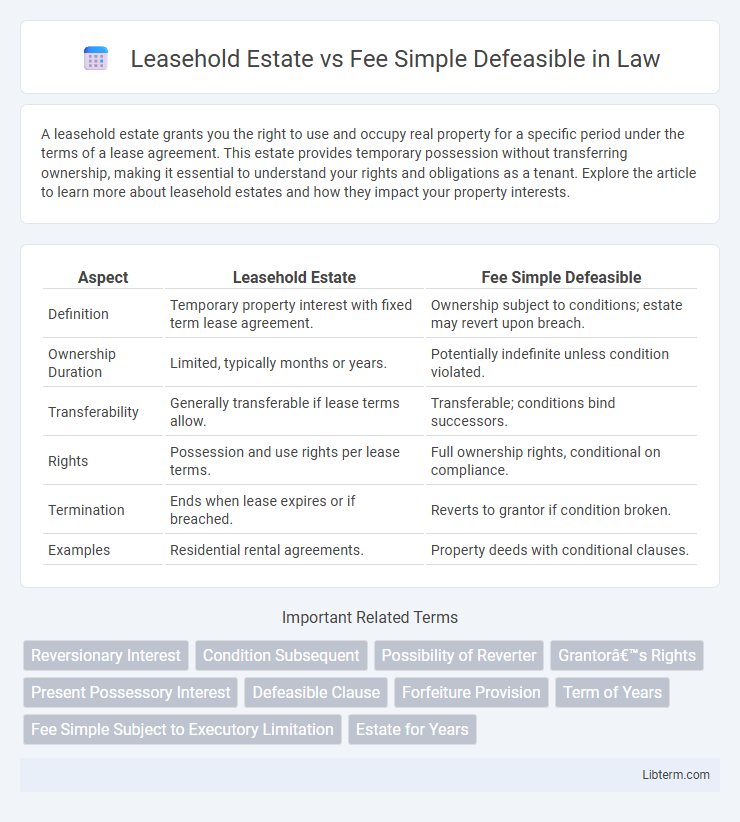A leasehold estate grants you the right to use and occupy real property for a specific period under the terms of a lease agreement. This estate provides temporary possession without transferring ownership, making it essential to understand your rights and obligations as a tenant. Explore the article to learn more about leasehold estates and how they impact your property interests.
Table of Comparison
| Aspect | Leasehold Estate | Fee Simple Defeasible |
|---|---|---|
| Definition | Temporary property interest with fixed term lease agreement. | Ownership subject to conditions; estate may revert upon breach. |
| Ownership Duration | Limited, typically months or years. | Potentially indefinite unless condition violated. |
| Transferability | Generally transferable if lease terms allow. | Transferable; conditions bind successors. |
| Rights | Possession and use rights per lease terms. | Full ownership rights, conditional on compliance. |
| Termination | Ends when lease expires or if breached. | Reverts to grantor if condition broken. |
| Examples | Residential rental agreements. | Property deeds with conditional clauses. |
Definition of Leasehold Estate
A Leasehold Estate grants a tenant the right to possess and use real property for a specified period under a lease agreement, creating a temporary interest unlike ownership. It is characterized by fixed terms, conditions, and the reversion of the property to the landlord upon lease expiration. This contrasts with Fee Simple Defeasible, which is an ownership estate subject to conditions that may cause forfeiture.
Overview of Fee Simple Defeasible
Fee Simple Defeasible is a conditional ownership interest in real property that grants the owner full possessory rights, subject to specific restrictions or conditions outlined in the deed. If the specified condition is violated or not met, the ownership may revert to the original grantor or a designated third party, creating a possibility of termination or forfeiture. This estate contrasts with leasehold estates, which confer temporary possession without ownership, as Fee Simple Defeasible provides potentially infinite duration contingent on compliance with stipulated terms.
Key Differences Between Leasehold and Fee Simple Defeasible
Leasehold estates grant tenants possession and use of a property for a specified term without ownership, typically involving rent payments, whereas fee simple defeasible estates provide ownership subject to conditions that, if violated, can revert the property to the grantor. Leasehold interests expire upon lease termination and do not convey title, while fee simple defeasible estates contain conditional ownership that lasts indefinitely unless the condition is breached. The key difference lies in the nature of possession versus conditional ownership, impacting rights, transferability, and duration of interest in the property.
Types of Leasehold Estates
Leasehold estates include types such as estate for years, periodic tenancy, tenancy at will, and tenancy at sufferance, each defining specific lease durations and tenant rights. Fee simple defeasible refers to ownership with conditions that, if violated, can revert the property to the grantor, differing fundamentally from leasehold's temporary possession. Understanding the distinct legal frameworks helps clarify rights and responsibilities in property agreements.
Types of Fee Simple Defeasible Estates
Fee simple defeasible estates include fee simple determinable and fee simple subject to condition subsequent, each imposing specific conditions on ownership that can lead to termination of the estate if violated. A fee simple determinable automatically ends and reverts to the grantor upon the breach of a condition, often indicated by phrases like "so long as" or "during." In contrast, fee simple subject to condition subsequent requires the grantor to take action to reclaim the property after a condition is broken, without automatic termination.
Duration and Ownership Rights
A leasehold estate grants possession and use of property for a fixed term without ownership, typically lasting months to years, while fee simple defeasible provides ownership that may revert to the grantor upon violation of specified conditions and lasts indefinitely. Leasehold rights are limited and do not include title ownership, whereas fee simple defeasible holders maintain full ownership rights subject to conditional restrictions. Duration in leasehold is temporary and contractual, contrasting with fee simple defeasible's potentially perpetual ownership dependent on compliance with the defeasible terms.
Transferability and Inheritance
Leasehold estates grant tenants possession and use rights for a specified term, typically non-transferable without landlord consent, and expire upon lease end, preventing inheritance. Fee simple defeasible estates provide ownership contingent on specific conditions, allowing transfer and inheritance like fee simple absolute unless conditions cause forfeiture. Transferability in fee simple defeasible is subject to condition enforcement, whereas leasehold interests prioritize contractual duration and landlord approval.
Common Uses in Real Estate Transactions
Leasehold estates are commonly used in commercial real estate transactions where tenants require long-term occupancy without ownership, such as retail spaces or office leases. Fee simple defeasible estates frequently appear in residential and commercial property sales where the grantor imposes conditions or restrictions on the property's use, like zoning limitations or environmental covenants. Both structures facilitate specific control and flexibility in property rights, aligning with the financial and operational goals of buyers and lessors.
Legal Restrictions and Conditions
Leasehold estates impose specific legal restrictions through lease terms, limiting the tenant's rights to property use for a defined period without ownership transfer. Fee simple defeasible involves ownership with conditions; if these conditions are violated, ownership can revert to the grantor or a third party by legal action. Both estate types bind property interests through enforceable legal conditions, shaping rights and future ownership possibilities.
Pros and Cons of Leasehold Estate vs Fee Simple Defeasible
Leasehold estates offer tenants temporary property rights with lower upfront costs and flexibility but lack long-term ownership security, making them vulnerable to lease expiration or landlord decisions. Fee simple defeasible grants conditional ownership with the potential for inheritable title, providing more control and stability, yet it carries the risk of ownership loss if specific conditions are violated. Leasehold estates benefit those needing short-term occupancy, while fee simple defeasible suits parties desiring property control tied to particular contingencies.
Leasehold Estate Infographic

 libterm.com
libterm.com